- News
- Reviews
- Bikes
- Accessories
- Accessories - misc
- Computer mounts
- Bags
- Bar ends
- Bike bags & cases
- Bottle cages
- Bottles
- Cameras
- Car racks
- Child seats
- Computers
- Glasses
- GPS units
- Helmets
- Lights - front
- Lights - rear
- Lights - sets
- Locks
- Mirrors
- Mudguards
- Racks
- Pumps & CO2 inflators
- Puncture kits
- Reflectives
- Smart watches
- Stands and racks
- Trailers
- Clothing
- Components
- Bar tape & grips
- Bottom brackets
- Brake & gear cables
- Brake & STI levers
- Brake pads & spares
- Brakes
- Cassettes & freewheels
- Chains
- Chainsets & chainrings
- Derailleurs - front
- Derailleurs - rear
- Forks
- Gear levers & shifters
- Groupsets
- Handlebars & extensions
- Headsets
- Hubs
- Inner tubes
- Pedals
- Quick releases & skewers
- Saddles
- Seatposts
- Stems
- Wheels
- Tyres
- Health, fitness and nutrition
- Tools and workshop
- Miscellaneous
- Tubeless valves
- Buyers Guides
- Features
- Forum
- Recommends
- Podcast
review
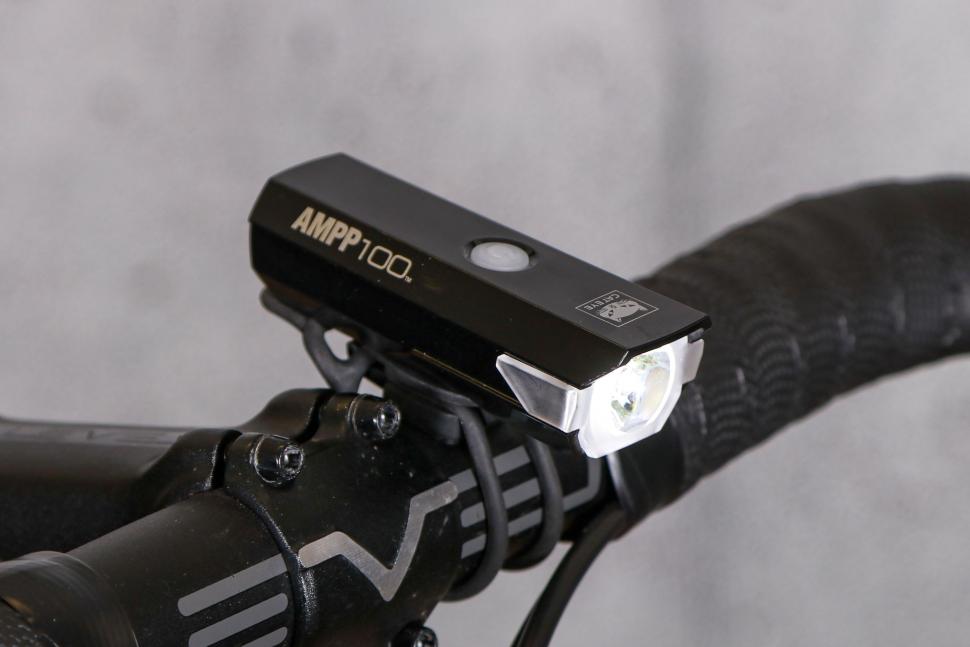 2021 Cateye AMPP 100 Front Light 2.jpg
2021 Cateye AMPP 100 Front Light 2.jpg£19.99
VERDICT:
Cheap but surprisingly cheerful light with a great flashing mode
Simple to use
Compact
Impressive flashing mode
Weight:
69g
Contact:
At road.cc every product is thoroughly tested for as long as it takes to get a proper insight into how well it works. Our reviewers are experienced cyclists that we trust to be objective. While we strive to ensure that opinions expressed are backed up by facts, reviews are by their nature an informed opinion, not a definitive verdict. We don't intentionally try to break anything (except locks) but we do try to look for weak points in any design. The overall score is not just an average of the other scores: it reflects both a product's function and value – with value determined by how a product compares with items of similar spec, quality, and price.
What the road.cc scores meanGood scores are more common than bad, because fortunately good products are more common than bad.
- Exceptional
- Excellent
- Very Good
- Good
- Quite good
- Average
- Not so good
- Poor
- Bad
- Appalling
The Cateye AMPP 100 front light is the baby of the AMPP family. Pumping out a maximum of 100 lumens and with two modes, the claims that 'it's an ideal choice for all riders' are stretching things a bit, but it is brighter than the numbers suggest and makes a useful town or 'companion' light.
Specification
The AMPP 100 measures 86 x 35 x 33mm and features a nicely executed composite body. I've not dropped it, but I haven't 'babied' it either, and it's bounced around in jersey pockets and bags without any obvious marks or swirls.
> Find your nearest dealer here
The single diode is projected through an Opticube lens, which Cateye says is designed to get the absolute best from the diode and lumens. In my experience, these lenses live up to the hype, although a standalone light putting out 100 lumens is still very much a town/contingency model. You're not going to be navigating rural backwaters at 25mph in the dead of night.
There are just two modes, constant or flashing, both 100 lumens, which keeps things simple and covers the basics. Despite this it also has a memory function, which sounds unnecessary but is handy just the same.
It's fuelled by a 3.7v 800mAh li-ion battery, reckoned good for 300 charge cycles before dropping to 70%, which should mean a few years of hard service before tapering off.
Weather resistance is IPX4, which taken literally means showery rain, but in practice it's reliable enough for everyday riding. I've had no problems in heavy rain or leaving it in situ when giving bikes a thorough wash. The micro-USB port cover fits snugly enough, and I've not found any issues with damp stuff creeping inside.
Micro-USB might seem a bit old hat these days, but it's ubiquitous enough, which is a good thing since, though serviceable, the cable supplied is a bit short for my tastes.
Switch
The top-mounted switch is a clear rubbery affair that stops short of feeling squishy. It requires a definite press – I've had no issues with accidental power-ups when it's been in a jersey pocket or bar bag – but is easily commanded in full finger, middleweight winter gloves. A half-second sustained press turns it on/off; a single press switches between constant and flashing.
The switch also acts as a very simple battery/charge life indicator: clear, or red when it's low on charge.
Mount
Cateye has gone the simple composite bracket with lugs and stretchy rubbery 'ladder strap' route. It's simple and secure, working with bars and accessory mounts between 22 and 30.8mm in diameter. You could even tether it upside down, or to the head tube. The rubber strap, though thinner than some, also feels up to the job, and if it does break or you lose it, o-rings will also work fine.
Output
I wasn't expecting much from the 100-lumen constant mode, but the arc of light is surprisingly pure and good enough for better lit sections. Through town, it gives a decent view of glass and other small hazards at a steady 15-17mph. The side windows are sensibly positioned too, offering reasonable peripheral bleed, without being obscured when cruising on the hoods.
Other traffic seemed to take note at around 25-30 metres, which is hardly going to win any awards, but adequate. Similar story with pedestrians and other riders along shared-use paths.
> Buyer’s Guide: The best 2021/22 front lights for cycling
Save for emergencies, I'd never suggest running it along unlit roads, but I was pleasantly surprised by how useful it was for reading road signs, rummaging through luggage and roadside inspections.
For these reasons, save for testing, I've defaulted to the flashing. This is much more to write home about. As a daylight running mode, the optical quality and pace make it stand out. Okay, not to the same degree as more powerful lights in bright winter sunshine, but I reckon I've snared the attentions of oncoming traffic at around 70-80 metres, further when it's dull and overcast.
It's great for standing out around town, especially when entering the flow of traffic and tackling roundabouts.
> Buyer’s Guide: 10 of the best rear lights for cycling
Out in the sticks, I've paired it with my 1,300-lumen dynamo lamps and been similarly impressed by its swift, bright tempo, particularly welcome during those 30-odd metres before the dynamo comes fully alive. Friends reckon they could spot the flashing setting at 100-120 metres, which is reassuring. Though extrovert, the tempo seems just slow enough not to irritate, or distract the rider, which isn't always the case in my experience.
Run-times and charging
Cateye cites 3.5 hours for the constant, 35 for the flashing, and so far, in temperatures ranging between 3 and 12°C, it's returned the full 3.5 hours in constant while the flashing has managed 34hrs 54mins.
The one minor thing to keep in mind is that it doesn't automatically kick down to flashing when reserves tumble.
It charges within the 2.5 hours cited.
Value
Although it's the same price, the Cateye strikes me as a better option than Decathlon's ELOPS Front LED Lock USB Bike Light FL520, which comes with a single, 28-lumen steady mode.
Oxford's Ultratorch Mini+ Headlight is also £19.99 and pumps out 100 lumens in the highest of four modes, but run-times are comparatively short.
A little dearer but worth it, I'd say, is Moon's Meteor Front Light at £24.99. The output and versatility mean it has broader horizons than the Cateye, with a 500-lumen day flash and 400-lumen constant. Admittedly, some of the constant modes have short run-times, but this is mitigated by the super-frugal flashing.
Conclusion
I've been pleasantly surprised by the AMPP 100. Frankly, I wasn't expecting a great deal from 100 lumens. In steady, we are talking town and around, but the 100-lumen flashing is surprisingly potent as well as being very frugal. Overall, I'd say it's a good contingency light for the best bike or as a companion light to a dynamo system.
Verdict
Cheap but surprisingly cheerful light with a great flashing mode
road.cc test report
Make and model: Cateye AMPP 100 Front Light
Size tested: 100 lumen
Tell us what the light is for, and who it's aimed at. What do the manufacturers say about it? How does that compare to your own feelings about it?
Cateye says: "The AMPP100 is an eco-friendly rechargeable 100 lumen light. Its lightweight and compact build makes it an ideal choice for all riders."
It's a simple light with better output than the numbers suggest. A decent enough town, or 'companion' model.
Tell us some more about the technical aspects of the light?
Cateye lists:
Compact rechargeable headlight (100 lm)
Easy to attach and remove, new rubber strap mount
Excellent side visibility
Low battery indicator
USB rechargeable (Micro-USB cable included)
Mode memory function
Two light modes (Constant / Flashing)
Cateye AMPP 100 USB Rechargeable Front Light
Opticube™: Cateye proprietary OptiCube™ lens technology maximizes brightness for greater visibility.
Side Visibility: Provides visibility from the side to increase safety.
USB Rechargeable: USB rechargeable products recharge that batteries from any USB port.
Low Battery Indicator: Alerts when remaining battery gets low.
Daytime: Can be used in the daytime.
All Weather IPX4: Can be used in rainy weather.
360° Adjustable: Light turns 360° for a multitude of lighting positions.
Features
Compact rechargeable headlight (100 lm)
Up to 35 hours runtime
Easy to attach and remove, new & improved rubber band mount with 360° rotation
Excellent side visibility
Low battery indicator
Lithium-Ion USB rechargeable battery (Micro-USB cable included)
Mode memory function
Two light modes (Constant / Flashing)
Weight: Only 62g
Designed in Japan
Rate the light for quality of construction:
7/10
Lightweight but solid throughout.
Rate the light for design and ease of use. How simple was the light to use?
9/10
Two modes and a user-friendly switch-cum-battery life indicator. Really intuitive to use.
Rate the light for the design and usability of the clamping system/s
8/10
Simple strap and mount are seemingly compatible with standard and oversize diameter bars.
Rate the light for waterproofing. How did it stand up to the elements?
6/10
IPX4 not the highest standard, but perfectly serviceable in the real world.
Rate the light for battery life. How long did it last? How long did it take to recharge?
7/10
Accurate charge and run-times. Given the output, run-time in constant is practical for regular short commutes. The flashing is far more impressive, both in terms of frugality and presence.
Rate the light for performance:
6/10
Brighter than the constant figure might suggest and the flashing is very assertive, though its horizons don't extend beyond town other than as a light for winter day rides on the best bike or a get-you-home.
Rate the light for durability:
6/10
Seems solid enough, especially given the price.
Rate the light for weight:
8/10
Rate the light for value:
6/10
Tell us how the light performed overall when used for its designed purpose
I wouldn't agree with Cateye's claims that it's an ideal choice for all riders, unless they're sure the output suits their needs. Spending a little more buys a more powerful, dare I say, more practical, light for general riding. However, the AMPP 100 is still adequate for town duties and the potent flash mode is surprisingly effective, day or night.
Tell us what you particularly liked about the light
Disarmingly good flashing mode, day or night.
Tell us what you particularly disliked about the light
Nothing, considering the price.
How does the price compare to that of similar products in the market, including ones recently tested on road.cc?
Although it's the same price, the Cateye strikes me as a better option than Decathlon's ELOPS Front LED Lock USB Bike Light FL520, which comes with a single, 28-lumen steady mode. Oxford's Ultratorch Mini+ Headlight is also £19.99 and pumps out 100 lumens in the highest of four modes, but run-times are comparatively short.
A little dearer but worth it, I'd say, for the higher output and versatility, is Moon's Meteor Front Light at £24.99. It has broader horizons than the Cateye, with a 500-lumen day flash and 400-lumen constant. Some of the constant modes have short run-times, but this is mitigated by the super-frugal flashing.
Did you enjoy using the light? Yes
Would you consider buying the light? As a contingency/companion to a main system, yes.
Would you recommend the light to a friend? Worth a look, in the above context.
Use this box to explain your overall score
It's a good, inexpensive light with a really useful flashing mode.
About the tester
Age: 48
I usually ride: Rough Stuff Tourer Based around 4130 Univega mtb Frameset My best bike is: 1955 Holdsworth Road Path and several others including cross & traditional road
I've been riding for: Over 20 years I ride: Most days I would class myself as: Experienced
I regularly do the following types of riding: cyclo cross, commuting, touring, fixed/singlespeed, mtb,
Shaun Audane is a freelance writer/product tester with over twenty-eight years riding experience, the last twelve (120,000 miles) spent putting bikes and kit through their paces for a variety of publications. Previous generations of his family worked at manufacturing's sharp end, thus Shaun can weld, has a sound understanding of frame building practice and a preference for steel or titanium framesets.
Citing Richard Ballantine and an Au pair as his earliest cycling influences, he is presently writing a cycling book with particular focus upon women, families and disabled audiences (Having been a registered care manager and coached children at Herne Hill Velodrome in earlier careers)
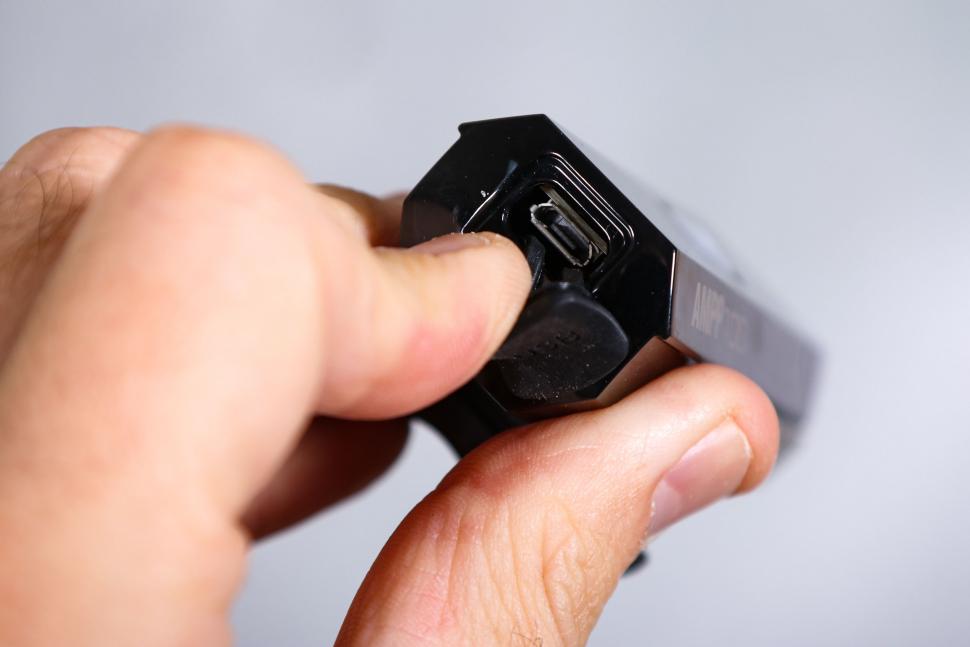




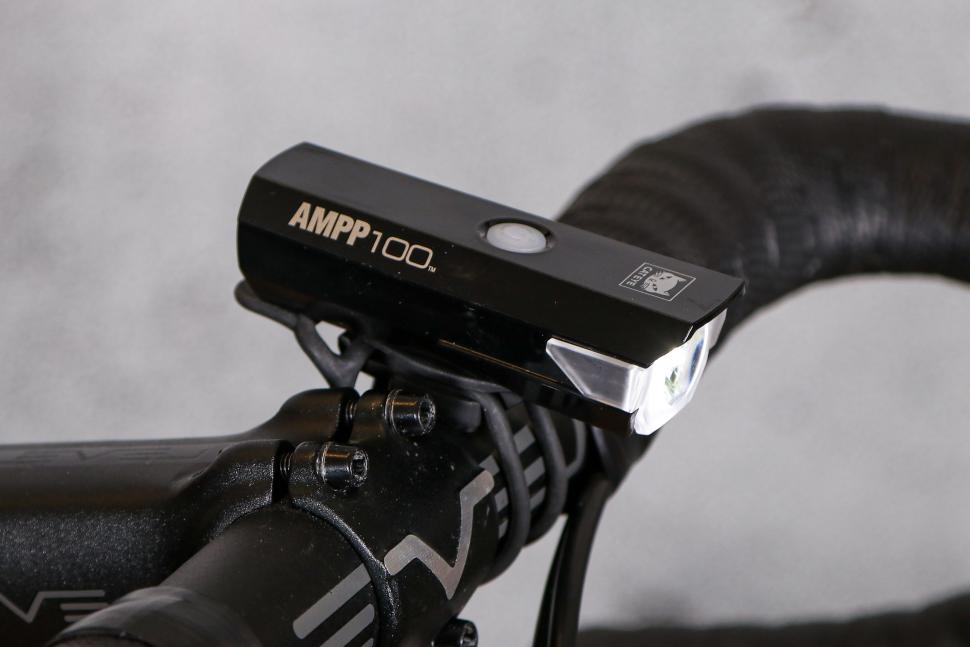
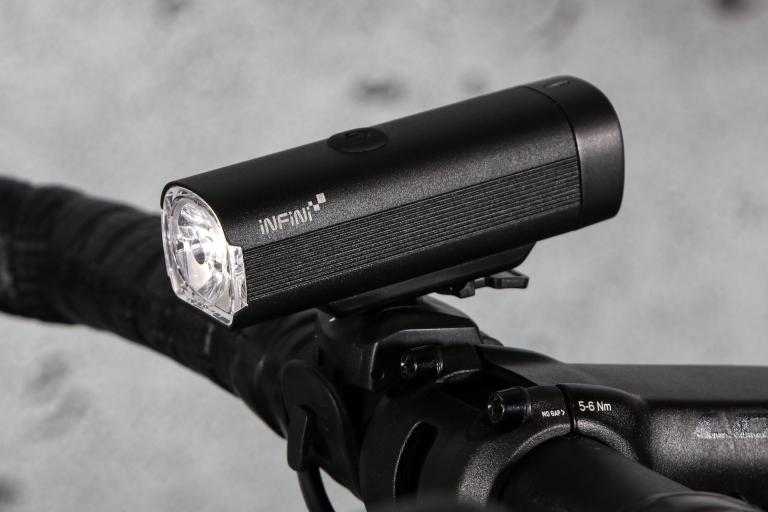
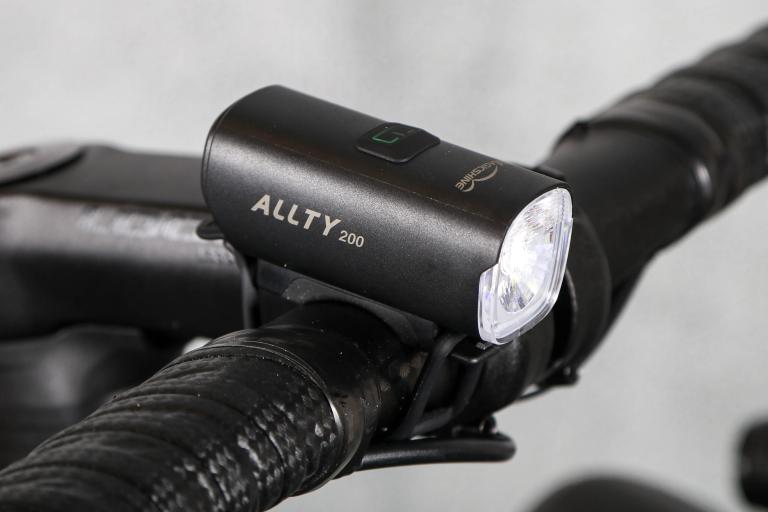
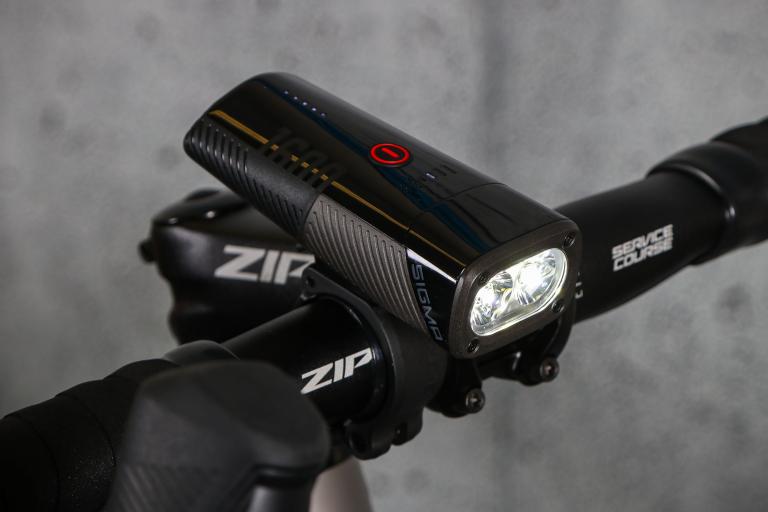
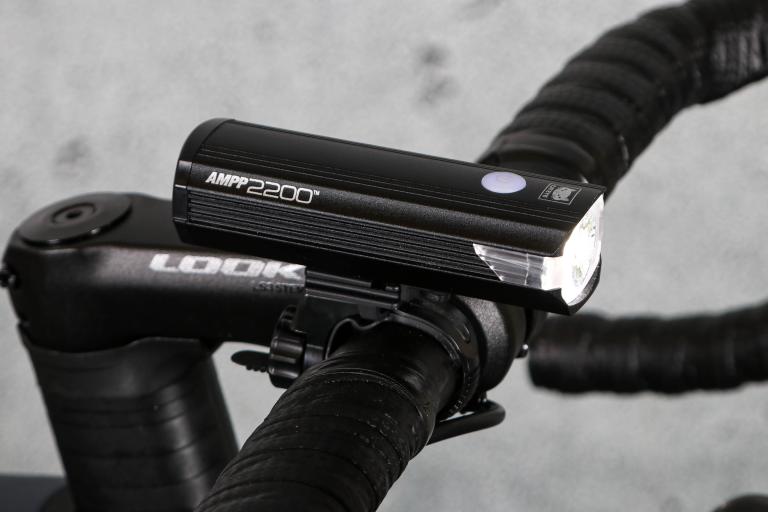
You a Sun writer? Rabid tribalism wasn't responsible for the Hillsborough disaster. Poor policing and management of the crowds, including stadium...
Saw that - and also a reassurance that politicians on both sides aren't necessarily keen on fewer deaths and injuries - if the way to that irks...
If you take a look at Google maps street view, from the Bush lane end, you'll see that there already seems to be hedges, either side of what looks...
Bonus for buses and lorries hitting bridges?
no, it wasn't.
I had this on my Forerunner 955 yesterday, needed a hard reset. The instructions were on the Garmin website. A time wasting annoyance but easily...
What's the power meter they use to provide the reference figure against which they make the claims for this one? Surely the former must be the...
I dunno, they complain that they spend all this money on cycle lanes and nobody uses them and then one does and...
It would be very interesting to know if there's any backward compatibility with anything. If a lever breaks on my rim braked Tiagra equipped bike,...
Pretty much all roads in the south lead to Argos, but beware some long lead times. ...